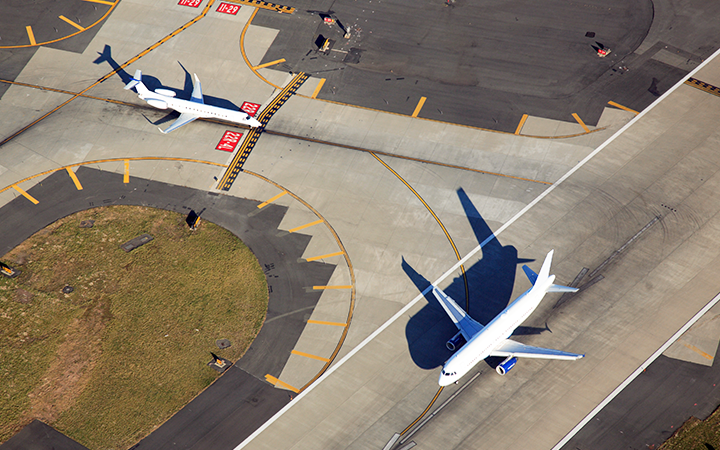INSIGHT
Unpacking airline alliances and codeshares

Airline alliances are strategic partnerships among carriers. They allow the travellers of each airline to get more benefits, streamline their logistics and enhance the overall travel experience for business travellers.
In this blog, we will delve into the three major airline alliances, explore their benefits for business travellers, and demystify the concept of codeshare flights.
If you’re interested in working with an alliance, we also have advice from Florian Mueller, Air Practice Lead at FCM Consulting throughout this article. “Consider all alliances and ask for details of what the relationship could look like,” he advises. “It’s heavily dependent on the travel patterns of each individual program to analyse which alliance is the best fit.”
What are the three major airline alliances?
The three airline alliances in the world boast large global flight networks. Click on each alliance below to discover which airlines are included.
-
oneworld
Alaska Airlines
American Airlines
British Airways
Cathay Pacific
Finnair
Fiji Airways
Iberia
Japan Airines
Malaysia Airlines
Oman Air
Qantas
Qatar Airways
Royal Air Maroc
Joyal Jordanian
Sri Lankan Airlines
-
SkyTeam
Aerolineas Argentinas
Aeromexico
Air Europa
Air France
China Airlines
Czech Airlines
Delta Air Lines
Garuda Indonesia
ITA Airways
Kenya Airways
KLM
Korean Air
Middle East Airlines
Saudia
TAROM
Vietnam Airlines
Virgin Atlantic
XiamenAir
-
Star Alliance
Aegean
Air Canada
Air China
Air India
Air New Zealand
ANA
Asiana Airlines
Avianca
CopaAirlines
Croatia Airlines
Egypt Air
Ethiopian Airlines
Eva Air
LOT Polish Airlines
Lufthansa Group Airlines
SAS
Shenzhen Airlines
Singapore Airlines
South African Airways
TAP Air Portugal
Thai
Turkish Airlines
United
Alliances benefits for business travellers
Unified loyalty programs
What Florian describes as the biggest benefit is that many alliances allow business travellers to earn and redeem points seamlessly across member airlines. This integrated approach enhances the overall travel experience as travellers get benefits like airport lounge access, possible upgrades, seat assignments and checked luggage entitlements.
- oneworld: Airline loyalty program tier is matched to one of the three tiers in oneworld Priority.
- SkyTeam: No SkyTeam program – sign up to an airline’s program and earn and redeem across member airlines.
- Star Alliance: Airline loyalty program tier is matched to one of two tiers in the Star Alliance program.
Global connectivity and coordinated schedules
Airline alliances open up an extensive network of destinations across a wide range of countries. This connectivity minimises layover times, reduces travel fatigue, and maximises productivity for professionals on the go.
Alliances also coordinate flight schedules to minimise layover times and optimise connections. Perfect for business travellers who require efficient and time-sensitive travel plans.
Shared facilities
Business class lounges, check-in counters, and baggage handling facilities are shared among members of the same alliance. All three airline alliances offer priority services to eligible travellers – usually those that have reached a loyalty member tier or are travelling in Business or First. By sharing facilities, it creates a consistent and seamless experience for travellers, irrespective of the airline they choose to fly with.
What is a codeshare flight?
Codeshare flights are when two or more airlines agree to share flight services on a particular route. For example, British Airways can sell a flight option to New York with its own flight number, but the actual flight is operated by American Airlines.
For business travellers, codeshare flights mean more flexibility, expanded route options and better connectivity, while still earning loyalty points. Travellers should check who the flight is operated by so they aren’t disappointed if they’re expecting another carrier’s experience and product.
While codeshare flights booked directly on a consumer website can be tricky to change, you don’t have to worry about that with TMC bookings, as the agent will do it for you!
Tips for travel managers
If you’re managing a global travel program, working with an alliance could be the ticket to saving time and money. Corporate agreements through an alliance mean you have a single point of contact, and one contract, so there are fewer people to talk to, and less paperwork. That then equates to just one report for tracking the performance of your contract too.
“It depends on the alliance, but some offer very valuable corporate discount programs where all airlines can easily be added “off-the-shelve” as long as the airline sees opportunities,” advises Florian. “Smaller client programs may not have enough volume to qualify at all, while very large programs may be able to negotiate better deals with member airlines. Those contracts may be had directly with airlines but each contract would need to be managed individually vs simply having one alliance deal to manage.”
As with all supplier negotiations, it’s important to choose an alliance that matches your goals. Our experts in FCM Consulting can help with the selection, after analysing factors such as which airlines you spend the most money with, what coverage you need and more.
Florian also advises exploring joint ventures. “Joint ventures are more relevant than alliances, as joint ventures have government approved ATI in place which lets them offer a joint contract to the client (harmonised network offer, discounting and other benefits),” he explains. “The partnership level is deeper with joint ventures with alliances but alliances have a broader geographical coverage.”

